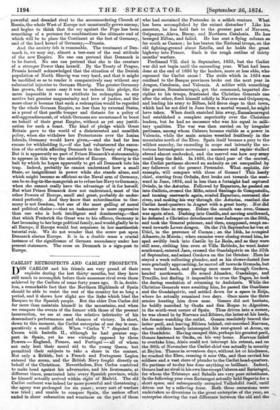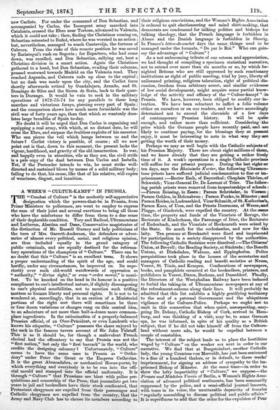CARLLST RETROSPECTS AND CARLIST PROSPECTS.
DON CARLOS and his friends are very proud of their exploits during the last thirty- months, but they have still much to accomplish before their successes rival even those achieved by the Carlists of some forty years ago. It is, doubt- less, a remarkable fact that the Northern Highlands of Spain should be able to resist the rest of the country for so long a period, and it shows how slight are the links which bind the Basques to the Spanish people. But the elder Don Carlos did far more than maintain himself in the mountains, and when we compare the events of the former with those of the present insurrection, we see at once the relative inferiority of his descendant's performances and chances of victory. In short, down to this moment, the Carlist enterprise of our day is com- paratively a small affair. When "Carlos V." disputed the Crown with Isabella H., although he had greater sup- port in Spain, yet he was virtually opposed by three Powers — England, France, and Portugal — all of whom not only lent their moral aid to the young Queen, but permitted their subjects to take a share in the contest. Not only a British, but a French and Portuguese Legion entered the arena, and the British Navy fought directly on behalf of the Christinos. Nevertheless, Don Carlos contrived to make head against his adversaries, and his lieutenants, at different times, penetrated into every Spanish province, while he himself actually arrived within sight of Madrid. The old Carlist outburst was indeed far more powerful and threatening ; the agony was prolonged for six years ; every sort of warfare was tried ; and unable to conquer Spain, the useless effort ended in sheer exhaustion and weariness on the part of those who had sustained the Pretender in a selfish venture. What has been accomplished by the extant disturber ? Like his ancestor, he has held fast to the greater part of Navarre, Guipuzcoa, Alava, Biscay, and Northern Catalonia. He has besieged Bilbao, and failed. He has sent a flying column as far south as Cuenca ; he has beaten the National troops, on the- old fighting-ground about Estella, and he holds the great highway into France. Such is the rough outline of thirty months' warfare.
Ferdinand VII. died in September, 1833, but the Carlist war did not begin until the succeeding year. What had been done at the end of 1836 by the leaders, more or less able, who- espoused the Carlist cause ? The strife which in 1834 was confined to the Basque provinces broke out the next year in Aragon, Catalonia, and Valencia. A soldier with something like genius, Zuraalacarregui, got the command, imparted dis- cipline to his troops, frustrated the Christino Generals one after the other, fixed himself solidly in Navarre and Guipuzcoa, and leading his army to Bilbao, laid fierce siege to that town, which had he not died in June from a mortal wound, he might have taken. When death snatched him away, Zumalacarregui had established a complete superiority over the Christino leaders but he had no successor who was his equal in mili- tary qualities. The war was then carried on by irregular partisans, among whom Cabrera became visible as a power in Valencia, while the main armies wrestled fruitlessly in the mountains north of the Ebro. Spain itself became a prey to the- wildest anarchy, far exceeding in scope and intensity the no- torious Intransigente movement ; massacre and rapine stalked abroad almost unchecked, and the marvel was how any army could keep the field. In 1836, the third year of the contest, the Carlist partisans showed an audacity as yet unequalled by any followers of the present Pretender. What exploits, for example, will compare with those of Gomez ? This hardy chief, starting from Ordufia, first broke out towards the west- ward in June, 1836, and in less than a fortnight had captured Oviedo, in the Asturias. Followed by Espartero, he pushed on into Gallicia, crossed the Mffio, seized Santiago de Compostella, and turning eastwards again evaded Espartero, recrossed the river, and making his way through the Asturias, reached the Carlist head-quarters in August with a great booty. Nor did he waste time in repose. Before the month was over, Gomez was again afoot. Dashing into Castile, and moving southward, he defeated a Ohristino detachment near Jadraque on the 30th, and took the General prisoner, and then, unopposed, swept on- ward towards Lower Aragon. On the 7th September he was at Utiel, in the provence of Cuenca ; on the 16th, he occupied Albacete, in Marcia; when enemies were closing round him, he sped swiftly back into Castile by Le Rode, and as they were still near, striking him even at Villa Robledo, he went faster southward, entered Jaen, crossed the Guadalquivir on the 27th of September, and seized Cordova on the 1st October. Here he stayed a week collecting plunder, and as his slower-footed foes were gradually approaching, he moved off towards Granada, but soon turned back, and passing once more through Cordova, headed northwards. He seized Ahnaden, Guadalupe, and Truxillo, but finding it impossible to cross the Tagus, he took the daring resolution of returning to Andalusia. While the Chiistino Generals were awaiting him, he passed the G-uadiana and the Guadalquivir, and settled down for a space in Ecija, where he actually remained two days. Once more the three armies hunting him drew near. Gomez did not hesitate, he boldly marched by Osmia and San Roque to Algeciras, in the south-west corner of Spain. Thus driven into a corner, he was dosed in by Narvaez and Ribiero, the latter at his heels, the former watching the outlet. Gomez resolutely braved the latter peril, and leaving Ribiera behind, out-marched Narvaez, whose soldiers barely intercepted his rear-guard at Amos, on the Guadalete. Having escaped this, perhaps his greatest peril, Gomez hastened to Osuila on his way home. Narvaez failed to overtake him, Alaix cold not intercept his retreat, and on the 30th of November the Carlist chief was actually in security at Baylen. Thence in seventeen days, without let or hindrance, he reached the Ebro, crossing it near One, and thus carried his soldiers and a vast store of plunder to the Carlist head-quarters. No partisan of to-day has done anything so brilliant. Indeed, Gomez had no rival in his own line except Cabrera and Zariategui, for whom the Tristanys and Saballs are very poor substitutes. In the following year even Zariategui actually held Segovia for a short space, and subsequently occupied Valladolid itself, until driven out by a relieving force. Both these excursions were undertaken as diversions to the great enterprise of the year, an enterprise showing the vast difference between the old and the new Carlisle. For under the command of Don Sebastian, and accompanied by Carlos, the Insurgent army marched into Catalonia, crossed the Ebro near Tortosa, advanced to Valencia, which it could not take ; then, finding the Christinos coming on, Sebastian retreated to ButIol, where he was worsted in an action ; but, nevertheless, managed to reach Cantaveija, the fortress of Cabrera. From the risks of this remote position he was saved by Zariategui's rush on Segovia ; for Espartero, who had come down, was recalled, and Don Sebastian, sallying out, beat a Christino division in a smart action. Again the Christinos gathered to a head, but Don Sebastian, evading their columns, pressed westward towards Madrid on the Valencia road. They reached A rganda, and Cabrera rode up close to the capital ; but no dash was made upon the city, and the Carlist force shortly afterwards retired by Guadalajara, Aranda, and St. Domingo de Silos and the Sierra de Soria, back to their quar- ters in Durango. It would be vain to seek in the military operations of 1872-73-74 for any parallels to these long marches and victorious forays, piercing every part of Spain ; and the comparison shows how much more formidable was the civil war of forty years ago, than that which so wantonly deso- lates large breadths of Spain to-day.
No doubt it will be urged that Don Carlos is organising and equipping a real army, with which, at no distant date, he will cross the Ebro, and surpass the fruitless exploits of his ancestor. Who'can pierce the veil which hangs between us and the future Carlist victory is possible, of course ; all we now point out is that, down to this moment, the present lacks the vigour, hardihood, and gravity of the old insurrection. In war, and happily even in atrocities, vile as they are, the civil strife is a pale copy of the duel between Don Carlos and Isabella. Yet, if the Pretender intends to win, he must strike Well- directed and sustained blows by means of a solid military body ; failing to do that, his cause, like that of his relative, will expire of weariness, disgust, and inanition.































 Previous page
Previous page